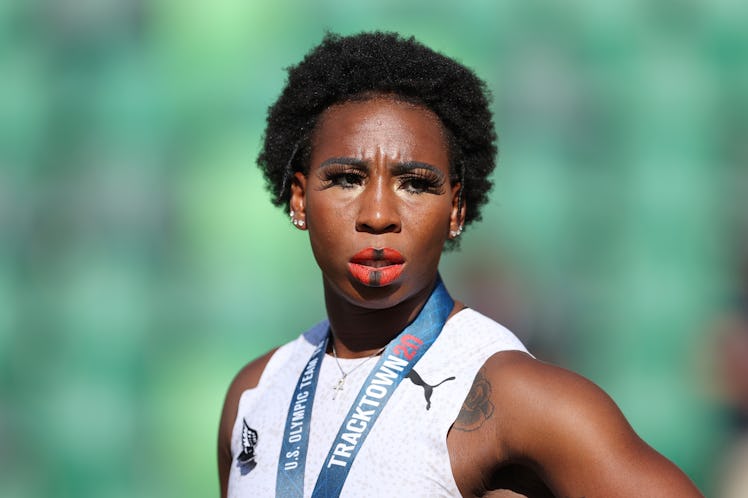
Gwen Berry Explained Her Olympic Trials Anthem Protest And There's A Lot Going On
She called it a “setup.”
Hammer thrower Gwen Berry knows a thing or to about being a champion. In 2016, she represented the United States at the Olympic Games in Rio de Janeiro, Brazil, and in 2019, she earned gold at the Pan American Games in Lima, Peru. Berry also knows a thing or two about being a champion for what she believes in, even if it means facing harsh public backlash. People may have a lot to say, but Gwen Berry's comments about the anthem at her Olympic trials explain everything.
On June 26, Berry raised controversy for her reaction to the national anthem during the medal ceremony for the Olympic trials. After placing third in the hammer throw, qualifying her for the Tokyo Games this summer, Berry was seen turning away from the flag and national anthem during the awards ceremony for medalists. While Berry’s two competitors, silver medalist Brooke Anderson and gold medalist DeAnna Price, placed their hands on their hearts and faced the flag as the national anthem played, Berry placed her hand on her hip and turned away toward the stands. Near the end of the song, she placed a black t-shirt that said “Activist Athlete” on her head.
Unlike the Olympics, the national anthem doesn’t traditionally play during medal ceremonies at the Olympic trials. “I feel like it was a setup, and they did it on purpose,” Berry told ESPN in a June 26 interview, referring to the anthem’s timing. “They said they were going to play it before we walked out, then they played it when we were out there,” she added. As an outspoken activist who’s previously used her platform as an athlete to protest racism and injustice, she found it hard to believe the Star-Spangled Banner playing while she was in the spotlight was a coincidence. "I was pissed, to be honest.”
According to Susan Hazzard, USA Track and Field spokeswoman, the anthem playing while athletes were receiving medals happened by chance. “The national anthem was scheduled to play at 5:20 p.m. today. We didn't wait until the athletes were on the podium for the hammer throw awards,” she told ESPN. “The national anthem is played every day according to a previously published schedule.”
Protests during the national anthem have been a lightning rod for controversy ever since Colin Kaepernick, a football player formerly with the San Francisco ‘49ers, began taking a knee during the national anthem as a way to call attention to police brutality and racism in 2016. The protests took off around the country, with professional athletes on other teams and in other sports joining in. It was also enormously controversial, with opponents — including former President Donald Trump — calling to punish protesting athletes.
This isn’t the first time Berry has used her platform to stand against systemic racism in the United States. During the awards ceremony at the 2019 Pan American Games in Lima, she raised her fist at the end of the Star Spangled Banner to protest against injustice in America. “Somebody has to talk about the things that are too uncomfortable to talk about. Somebody has to stand for all of the injustices that are going on in America and a president who’s making it worse,” Berry told USA TODAY Sports in an August 2019 interview.
While people all over Twitter have posted in support of Berry’s actions on June 26, she’s still facing some harsh backlash on social media, with some saying she should be banned from the Olympics altogether.
But other Twitter users are coming to Berry’s defense, and certainly aren’t shying away from calling out the irony of chastising Berry for allegedly disrespecting the American flag — especially in light of the January 6 U.S. Capitol riots, where images of the mob that stormed the Capitol showed the flag being literally used as a weapon against Capitol police officers.
Although many people are pushing to have Berry banned from the upcoming Olympic games because of her protest, that won’t happen. In a March 30 open letter to athletes, Sarah Hirshland, US Olympic and Paralympic Committee CEO, explained that “respectful demonstrations on the topic of racial and social justice” would be permitted during the Olympic trials. “While we support your right to demonstrate peacefully in support of racial and social justice, we can't control the actions others may take in response,” Hirshland added in the letter.
However, Berry — and other athletes — will be prohibited from demonstrating at the Olympics themselves. According to the International Olympic Committee (IOC), “no kind of demonstration or political, religious or racial propaganda is permitted in any Olympic sites, venues or other areas.” So, there will be a ban on protests and demonstrations at the upcoming Tokyo Olympic Games.
While she won’t be allowed to protest at the Games themselves, Berry had the right to throw down her hammer at the trials — and whether you like it or not, she’s still one of America’s Olympic representatives. “My purpose and my mission is bigger than sports,” Berry told ESPN. “I’m here to represent those ... who died due to systemic racism. That’s the important part. That’s why I’m going. That’s why I’m here today.”